Has Queen Bee of dating world lost her crown? Billionaire Bumble boss Witney Wolfe Herd quits as CEO… as Gen Z find alternatives to ‘swipe-right’ craze

She was the ‘queen bee’ of the online dating world, whose idea led to her becoming the youngest self-made female billionaire, rubbing shoulders with the likes of Meghan Markle.
As the founder and chief executive of Bumble, Witney Wolfe Herd transformed the dating landscape for millions of women, by putting them in charge of who they matched with.
It was a simple idea based on the 34-year-old’s own harrowing experiences at the matchmaking app Tinder, which she co-founded and later sued, claiming ‘atrocious sexual harassment and sex discrimination’, largely by her co-founder and ex, Justin Mateen.
It’s estimated Wolfe Herd won a $1 million (£820,000) settlement despite Tinder denying any wrongdoing. But afterwards, she was met by a torrent of abuse online which sent her into a spiral of depression and heavy drinking, ‘I was only 24, and already I felt like I was finished,’ she later wrote.
Then, joining forces with billionaire Russian tech mogul Andrey Andreev, she launched Bumble, which required women to make the first move when couple’s match, an idea that cut down a vast amount of abuse women faced.

Witney Wolfe Herd transformed the dating landscape for millions of women, by putting them in charge of who they matched with
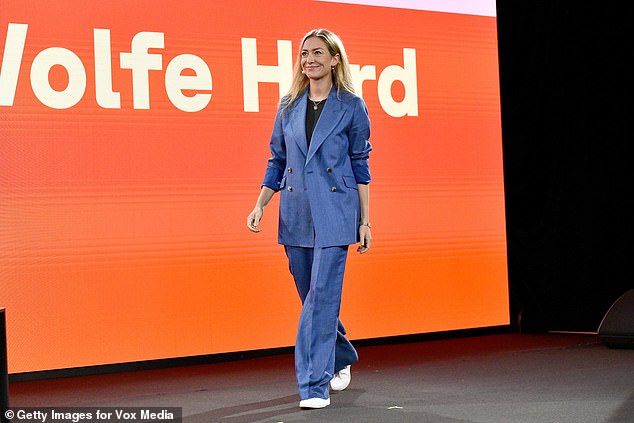
She stepped down this week as the chief executive of Bumble, a company which made her a billionaire in 2021 (she is pictured in September 2023)
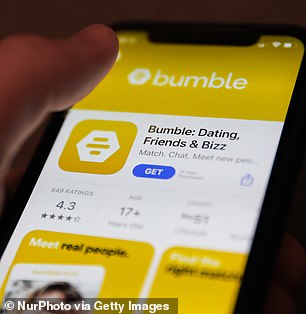
Bumble has more than 50 million active users, according to 2023 data
It was a stroke of genius that turned out to be worth a staggering £10.6billion. In 2021 a triumphant Wolfe Herd took her dating empire public, with her stake in the company making her at just 31 the youngest self-made female billionaire.
‘Witney’s development of women making the first move was absolutely huge, not just from technological and market perspective but also from sociological and psychological one too,’ Dr Jess Carbino, former sociologist for Tinder and Bumble told MailOnline.
‘She completely and totally changed the paradigm by empowering women. What she did was absolutely ground-breaking.’
Fast-forward to 2023 and this turned out to be a high point. In the past three years Bumble’s value has plummeted, with shares dropping from $75 (£61.47) to $12.77 (£10.47). And on Monday, Wolfe Herd shocked the industry by announcing she was stepping down as Bumble’s CEO.
Her departure comes a critical time, as companies battle to attract the next generation of match-making swipesters – some of whom say they are becoming increasingly turned off by the idea of finding love on a dating app.
Despite one in five 25 to 34-year-olds in Britain having used romance apps and usage globally being at a record high, as Millennials now settle down dating bosses having been struggling to entice new, younger audiences to their platforms.
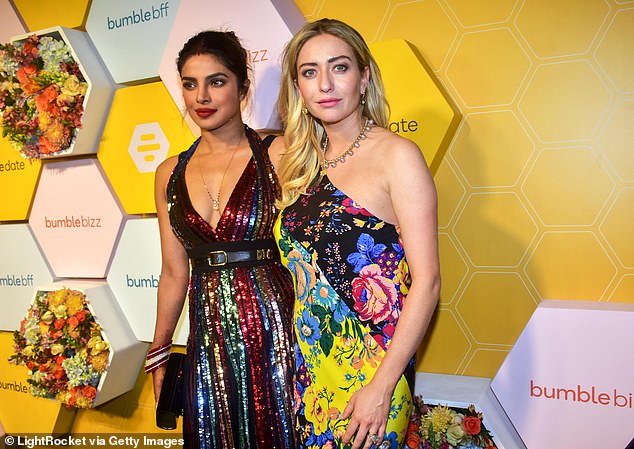
Bumble founder and former CEO Whitney Wolf Herd, (right), seen posing for a picture at Bumble’s India launch party at Soho House, Juhu In Mumbai in 2018

Wolfe Herd became the youngest self-made female billionaire in 2021. Pictured is a yacht during her birthday

Wolfe Herd’s idea behind Bumble revolutionised the dating app game, empowering women (she is pictured during her 30th birthday)
But they’re facing a challenge: almost two-thirds of Generation Z recently admitted they wanted to ditch swiping on apps and social media to find love in more traditional ways.
The group of young adults – aged between 18 to 24 – say dating apps have killed true romance and that love at first sight would always trump love at first swipe.
A survey for memoir-writing service StoryTerrace found 59 per cent of Gen Zers said parental love stories of meeting on a train, at a dance or in a pub were far more romantic than their experiences and led to longer-lasting relationships.
A further 68 per cent said they had not found true love through a dating app, and 33 per cent were jealous of parents and grandparents because of how they found love.
StoryTerrace founder Rutger Bruining said: ‘Our research shows that people are looking for more romantic ways to find love.
‘People prefer the narrative of “we met at an event, through someone, or super-randomly” rather than saying they met online.
‘Modern love is a whole different ball game.’
And with Gen Z saying they’re increasingly tired of the apps that have dominated the dating scene for a decade – Tinder, Hinge and Bumble – a number of new companies have sprung up.
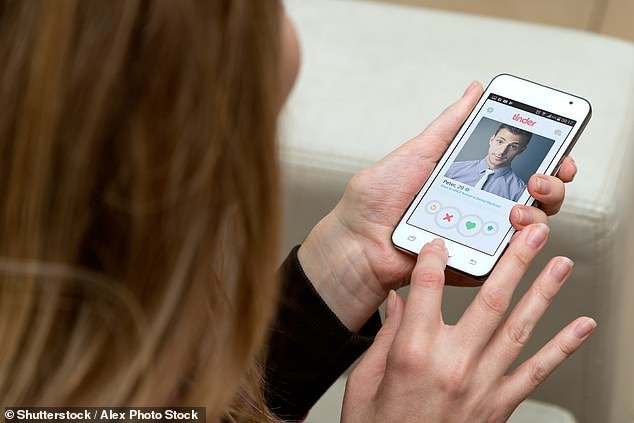
Almost two-thirds of Generation Z – those aged 18 to 24 – say online dating has killed true romance and that love at first sight would beat love at first swipe.
Among them is Snack, which brands itself as the ‘ultimate dating app for Gen Z rebels who want to break free from dating app monotony’.
Billed as a sort of ‘TikTok meets Tinder’, the app allows users to post videos of themselves. It also eliminated the swipe gesture in favour of pressing a heart button or sending a message. Attempting to do so brings up a cheeky error notification saying ‘swiping is old af’.
That’s not all that’s new. Users upload TikTok-style videos instead of pictures, there’s no field for a bio, and they can even upload videos to an Instagram-style ‘story’ that people can view after they match with them.
Other new entrants fixing their sights firmly on Gen Z includes Schmooze, which sees people being greeted by a meme set against a colourful, cartoon-like background instead of the traditional profiles.
Love-seekers have the choice of swiping right for ‘like’ and left for ‘don’t like’. After a certain amount of swipes, the app’s machine-learning model attempts to evaluate what sort of humour a person is into. At that point people are receive a ‘#MatchRec’ with someone whose humour apparently matches with theirs, leaving the user with the choice to ‘schmooze’ or ‘snooze’.
The company’s CEO Vidya Madhavan said the app was about ‘laughing your way to love’.
‘Meme-based dating fits so perfectly with this generation,’ Vidya told the LA Times said. ‘Because memes are the way we all communicate, right? Whether it’s sharing news or sharing how you feel.’
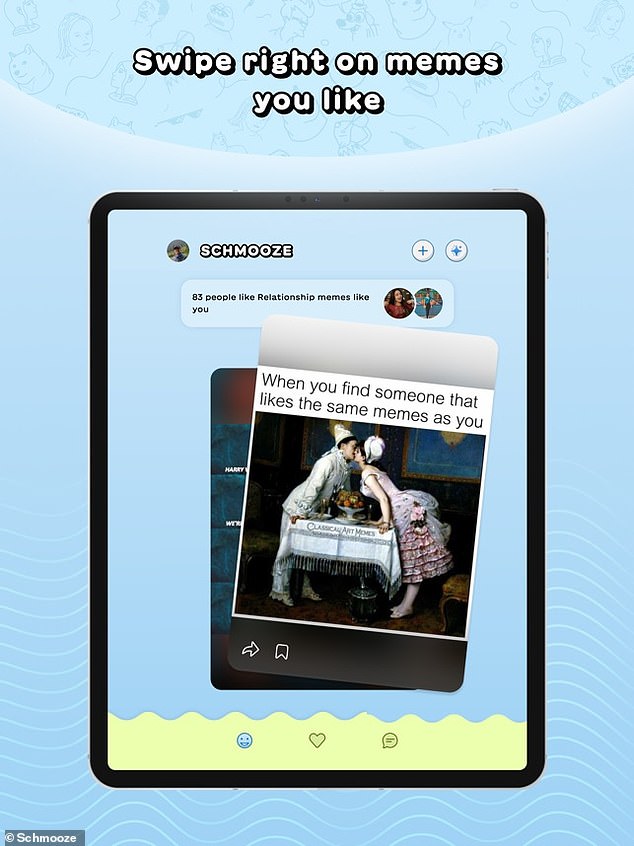
Schmooze launched with users swiping on memes to match with one another

The app’s machine-learning tech then tries to pair people with the same sort of humour and tastes
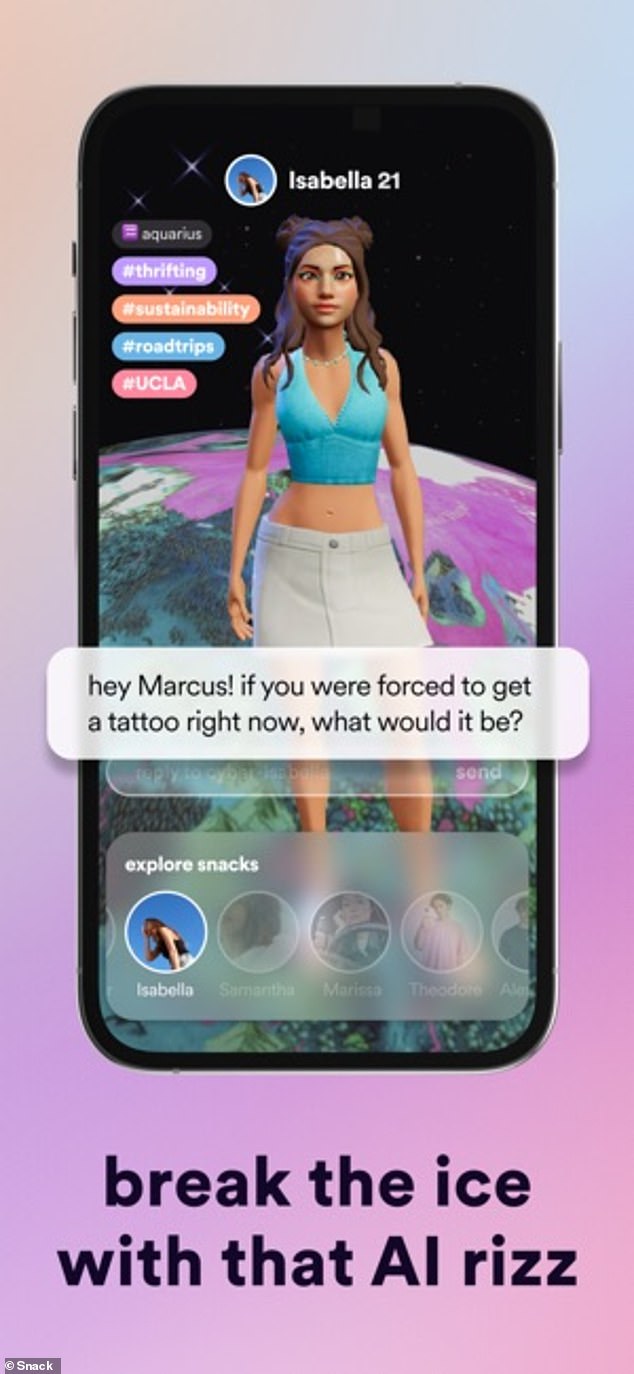
Snack brands itself as the ‘ultimate dating app for Gen Z rebels who want to break free from dating app monotony’.
Dr Jess added that Generation Z was not necessarily turned off by dating apps but were just not emotionally mature enough to be seeking out long-term relationships.
‘Millennials really came of age at a time when they were at a point to establish long-term relationships with the advent of Tinder and Bumble,’ she added.
‘Gen Z have had smartphones their entire lives. It’s not about them being disillusioned with dating apps. They’re young and not ready to establish long-term relationships.
‘I think when those in Generation Z reach the ages of 28, 29 or 30, they will be using dating apps in the same way as Millennials.’
Finding a dating app model that makes cash is another challenge facing the industry.
Bumble charges a fee of £14.99 a week for users who want special features, like seeing who have already ‘swiped right’ on their profile. Yet those who pay are in a small minority.
Equally, Tinder the most popular dating app in the UK and USA, has similar sort of paid-for feature, ranging from Tinder+ for £4.99 a month and a £7.49 monthly gold tier to Tinder’s top-end platinum subscription for £14.32 a month.
But statistics show that subscribers with the dating giant – which boasts 75million users – have dropped from a high of 11.1million globally in the third quarter of 2022 to 10.4million at the same point in 2023.
‘If you think about Gen Z, not everyone has disposable income at that time,’ Wolfe Herd told investors in August.
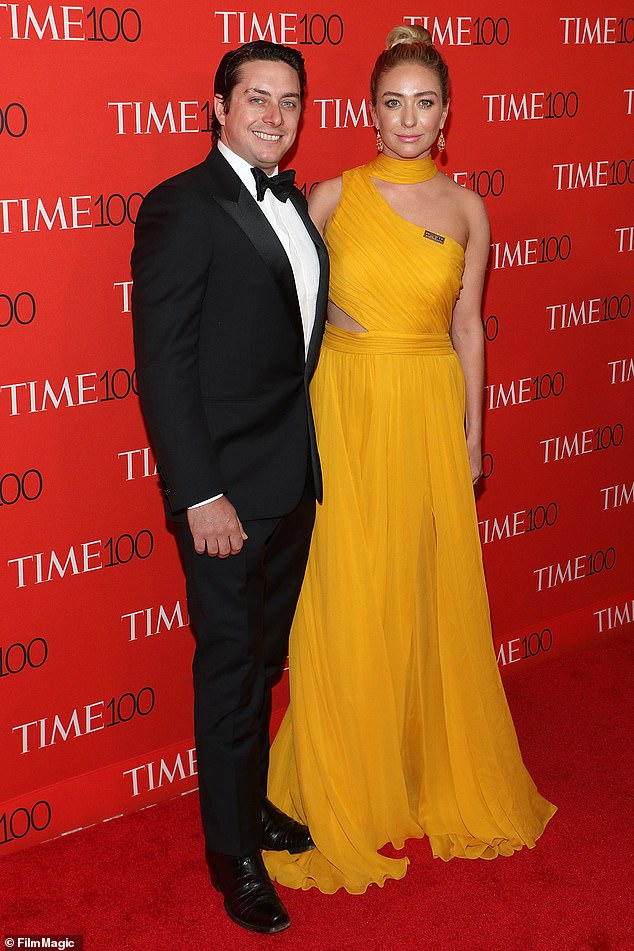
Michael Herd and Whitney Wolfe Herd attend the 2018 Time 100 Gala
Bumble is responding with cheaper subscriptions for younger users, and has acquired Fruitz, a dating app aimed at Gen Z, where users specify what sort of relationship they are looking for using fruit emojis.
Wolfe Herd stepped down from the company as its CEO but will become its executive chairman in January.
The news of her departure came just days after she was enjoying private jet trips with Harry and Meghan to watch Katy Perry’s residency performance in Las Vegas.
Whitney Wolfe Herd and her husband Michael Herd joined the Sussexes, as well as Cameron Diaz and her rocker husband Benji Madden, Zoe Saldana and Marco Perego, David Katzenberg and Stellina Bickers.
They all took the same private jet from Santa Barbara to Las Vegas last Saturday.
Whitney is married to Michael Herd, an oil and gas heir from Texas. They met on a skiing trip in Aspen and share two children together.
In 2020, he put his family’s three-home compound in Austin, Texas, on the market for $28.5 million.
Wolfe Herd has received accolade after accolade for her work within the tech and dating app space. She was named one of Business Insider’s 30 Most Important Women Under 30 In Tech in 2014.
And in 2016, she was named as one of Elle’s Women in Tech, before receiving the recognition as Forbes 30 under 30 in 2017 and 2018.
In 2021, Wolfe Herd became the world’s youngest self-made female billionaire after taking Bumble public.
Forbes estimated her net worth at approximately $1.5 billion.




